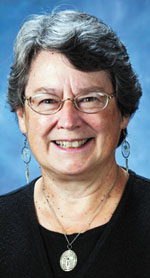(Editor’s note: This is the fourth of six talks we are publishing by local religious leaders who spoke at St. Ambrose University on Oct. 10, the vigil of the 50th anniverary of the opening of the Second Vatican Council. Corinne Winter is a professor of theology at St. Ambrose.)
By Corinne Winter

When I was attending a Catholic grade school in the years before Vatican II, one of our annual events was “vocation day.” On that day, we would go into a gym where we would wander among displays showing the work and lifestyle of dozens of communities of Sisters, Brothers and priests. We would then go to the church where we would pray for vocations and would be encouraged to consider whether we were being called to religious life.
All of that was great. It was just a bit incomplete because marriage and single life were never discussed as vocations — either on vocation day or at other times during our religious education. Of course, it was assumed that most of us would marry and that the example of our parents’ marriages and the guidance of the Church would show us how to live good lives in that state. But while it was never the official teaching of the Church, in fact many lay people thought of themselves as those who weren’t quite good enough to be chosen and that their best hope for affirmation of God’s favor was to have a child who would become a priest or join a religious community.
That thought can cut two ways — if we are not chosen for the team, we are also not responsible for its success or failure.
When people think of the effect of Vatican II on the laity, we often think first of what has been described as an explosion of lay ecclesial ministry. Suddenly, parish and diocesan staffs often include more lay people than priests and Sisters. Lay people take new roles in the liturgy — as readers and ministers of Communion. But I propose that the most important statement of the council with regard to the laity is found in Lumen Gentium chapter 5 — the exposition of the universal call to holiness. That chapter insists that by baptism, all are “truly sanctified” and “must hold on to and perfect in their lives that holiness which [we] have received from God” by living in accord with the fruits of the Holy Spirit whom we have received.
So, baptism is not only the sacrament by which we are cleansed, but the sacrament by which we are initiated into our vocation as Christians. Because the Church is a community, we are called to serve in different ways, to offer diverse gifts for the good of all. We are called to support, challenge and inspire one another as we meet different challenges and show a variety of strengths and weaknesses.
None of us can look at the need for growth in the Church and say that is someone else’s job. It is our job to do together. The role of the laity in the mission of the Church is traced to the earliest days of Christianity and is described as indispensible participation in the work of Christ as priest, prophet and king.
Both the document on the Church in the modern world and the document on the Laity (Apostolicam actuositatem) describe the particular sphere of lay ministry as the secular world. We are to bear witness by our lives to the holiness of all aspects of life on earth. That witness is vital for the Church’s mission to be a light for all nations, to be sign and instrument of the unity with God to which all of creation is called.
Christianity rejects dualism that would oppose sacred and secular. All Christians profess the doctrines of creation and incarnation. The material world is neither evil nor primarily a source of temptation but is the gift of a good and loving God — a gift to be received with reverence and treated with respect. Moreover, God has entered into human life and made it the place where we meet God.
Human work, human friendship and love, human struggle and human progress are not distractions from but are the very stuff of holiness. We set aside times of prayer and worship not in hopes of escaping the rest of our lives, but in order to make our relationship with God the source and goal of those lives.
What Vatican II has done for us as lay members of the Church is call us to embrace the lives we live with renewed appreciation and sense of responsibility. We are called. We are chosen. We can and must live holy lives where we are.
The roles that lay persons may fill in professional church ministry or in the liturgy are appropriate expressions of who we are as members of the body of Christ — people whose gifts are necessary for the being of the Church. Whether or not we are personally involved in these more visible ways in the Church’s public work, we ought to see them as signs of our calling. We are responsible for the Church’s mission. We can’t sit back and leave it to someone else.







